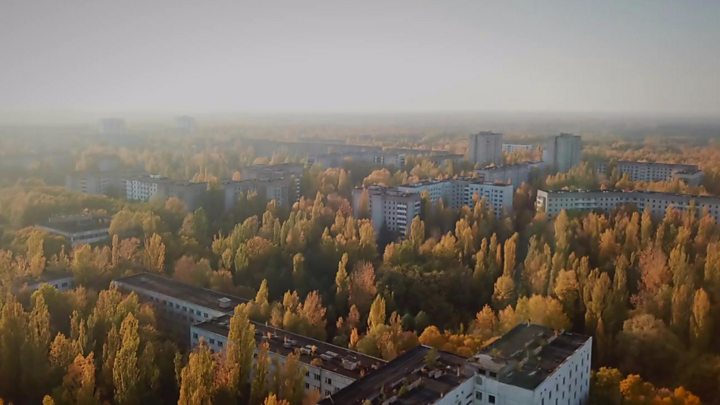Image copyright
Sky UK/HBO
At least 31 people were killed and many more were injured in the world’s worst nuclear power accident
The Russian culture ministry is partially funding an alternative TV dramatisation of the Chernobyl nuclear disaster, according to reports.
It follows the conclusion of HBO’s critically-acclaimed Chernobyl series, praised for its gritty approach.
But Russian state media has dismissed that show as “not the truth”.
Russian network NTV has received a $460,000 grant (£360,000) for its own series, The Hollywood Reporter confirmed.
The series is set to follow a KGB officer working to foil a CIA spy within the nuclear plant.
HBO’s five-part US drama, written by Craig Mazin and directed by Johan Renck, follows the fallout from the 1986 tragedy in Pripyat, Ukraine, that saw a failed nuclear reactor explode and cause unprecedented suffering through radioactive contamination.
Oscar-nominated actress Emily Watson portrays Ulana Khomyuk, a Soviet nuclear physicist intent on finding out how and why the Chernobyl disaster happened, amid a government cover-up.
The US mini-series aired its final episode to UK audiences via Sky Atlantic on Tuesday and currently sits top on IMDb’s all-time TV rankings.

Media playback is unsupported on your device
However, state-run television and Russian tabloids have accused the HBO series, which has aired in Russia on Amediatek to a positive public reception, of bias.
Stanislav Natanzon, an anchor of Rossia 24, one of the country’s main news channels, has argued that the Soviet authorities did admit their mistakes – something not reflected in the narrative of the HBO series.
Speaking on air, he said lead scientist Valery Legasov wrote an article in Komsomolskaya Pravda (KP) in 1987, criticising the official response to the tragedy.
Natanzon, however, failed to mention that editors initially refused to publish the piece, only doing so in 1988 after Legazov committed suicide.
Alexey Muradov, the director of the Russian remake has promised his show “will tell viewers about what really happened back then”.
He told KP the show “proposes an alternative view of the tragedy” through his villainous CIA storyline.
Principal photography has already begun in neighbouring Belarus. An air date is yet to be announced.
Analysis by Adam Robinson, BBC Monitoring
Image copyright
Sky UK Ltd/HBO
Trying to get behind the propaganda – Jessie Buckley as Lyudmilla Ignatenko and Emily Watson as Ulana Khomyuk
A common refrain among independent Russian reviewers was that “this was the film about Chernobyl that we Russians should have made”.
But for the Kremlin, the topic of history is a highly sensitive one – especially about the Soviet Union.
Official media now tend to paint a sanitised, idealised vision of the USSR, and portray Putin’s Russia as its spiritual heir.
This makes it easy to see any critical view of the Soviet past as an attack on the Kremlin’s ideological power base.
It’s a narrative it seeks to completely control and guard from outside influences – particularly from a West it sees as hostile.
Some Russians feel the version of reality offered by Kremlin-controlled media is not entirely unlike the lies told by the Soviet state.
As a result, perhaps the most dangerous idea was the key question running though Chernobyl – what is the cost of lies?
Follow us on Facebook, on Twitter @BBCNewsEnts, or on Instagram at bbcnewsents. If you have a story suggestion email entertainment.news@bbc.co.uk.
